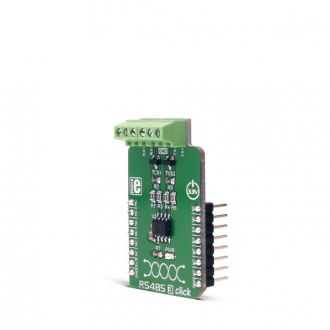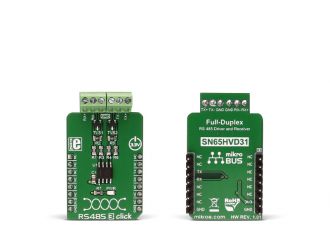
We strongly encourage users to use Package manager for sharing their code on Libstock website, because it boosts your efficiency and leaves the end user with no room for error. [more info]

Rating:
Author: MIKROE
Last Updated: 2018-06-14
Package Version: 1.0.0.2
mikroSDK Library: 1.0.0.0
Category: RS485
Downloaded: 11737 times
Not followed.
License: MIT license
RS485 3 click uses SN65HVD31DR from Texas Instruments, a tri-state differential line driver and differential input line receiver. The click is intended to be used as UART to RS422/RS485 communication interface. It is suited for transmitting smaller blocks of data over long distances, using the four-wire bus, allowing for full-duplex communication.
Do you want to subscribe in order to receive notifications regarding "RS485 3 click" changes.
Do you want to unsubscribe in order to stop receiving notifications regarding "RS485 3 click" changes.
Do you want to report abuse regarding "RS485 3 click".


Library description
Carries generic functions which are mostly wrappers for UART functions.
Key functions:
Examples Description
The application is composed of two sections :
void applicationTask()
{
char tmp;
uint8_t rdyFlag;
// RECEIVER - UART polling
rdyFlag = rs485_3_byteReady();
if (1 == rdyFlag)
{
tmp = rs485_3_readByte();
mikrobus_logWrite( &tmp, _LOG_BYTE );
}
// TRANSMITER - TX each 2 sec
/*
for (tmp = 0; tmp < 9; tmp++)
{
rs485_3_writeByte( MESSAGE_DATA[tmp] );
mikrobus_logWrite( "MESSAGE SENT", _LOG_LINE );
}
Delay_ms(2000);
*/
}
Other mikroE Libraries used in this example:
Additional notes and information
Depending on the development board you are using, you may need USB UART click, USB UART 2 click or RS232 click to connect to your PC, for development systems with no UART to USB interface available on the board. The terminal available in all MikroElektronika compilers, or any other terminal application of your choice, can be used to read the message.